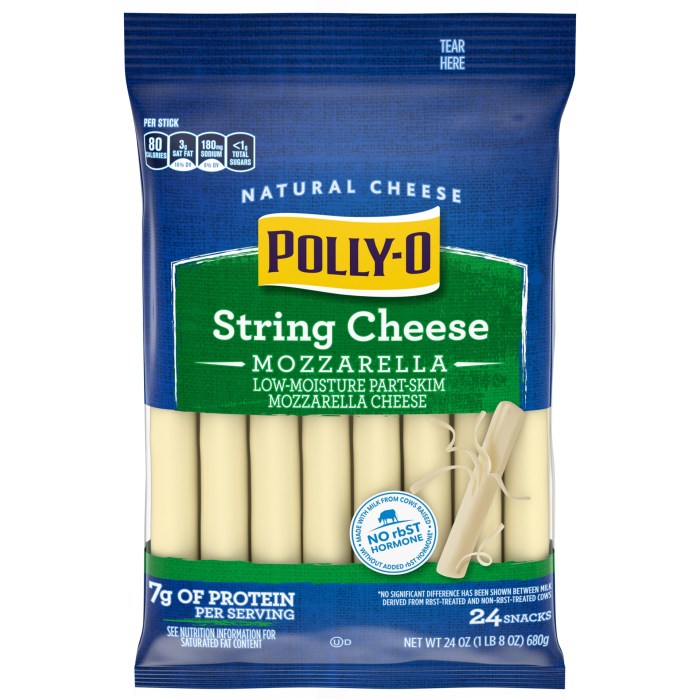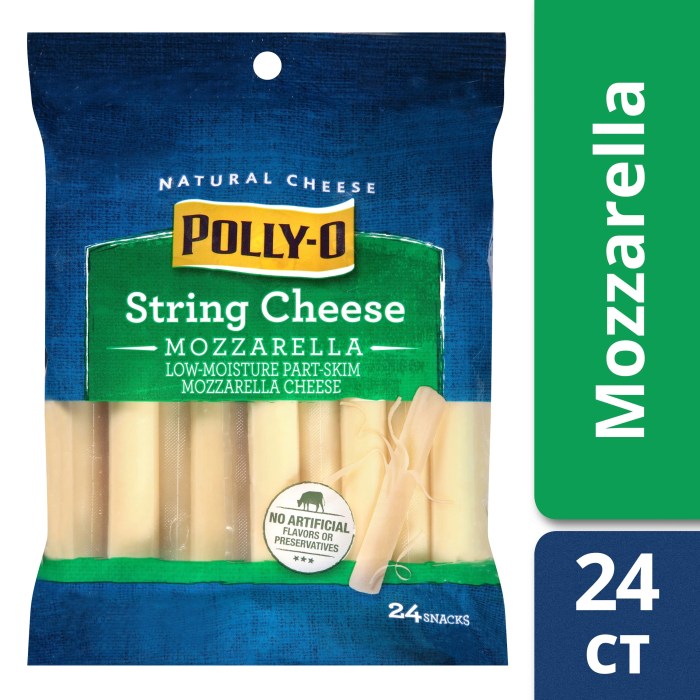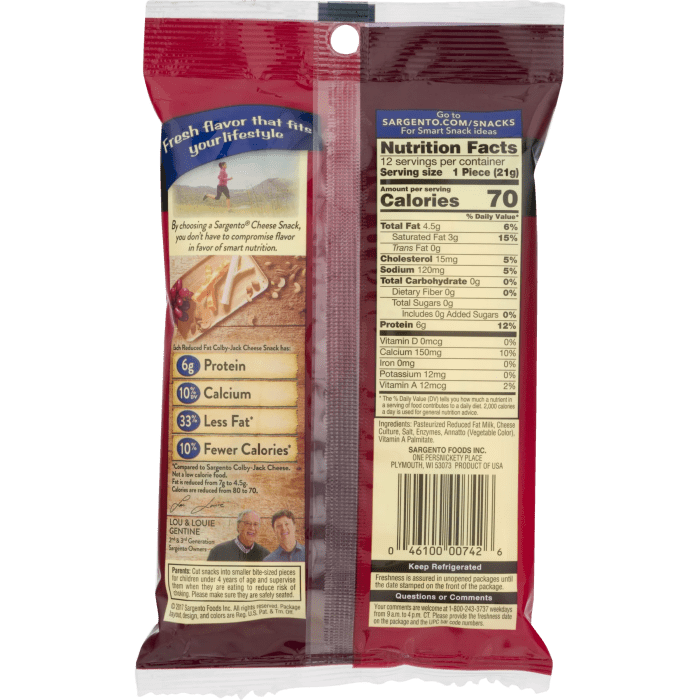Health Implications & Considerations

Polly-o string cheese nutrition label – Polly-O string cheese, a convenient and popular snack, presents a mixed bag in terms of its nutritional profile and impact on health. Understanding its composition and potential effects is crucial for making informed dietary choices. While offering a source of protein and calcium, it also contains notable amounts of fat and sodium, factors that warrant careful consideration within the context of a balanced diet.
The following sections detail the potential health benefits and drawbacks of incorporating Polly-O string cheese into one’s diet, examining its fat and sodium content, and its suitability for various dietary needs.
Nutritional Benefits and Drawbacks of Polly-O String Cheese
Polly-O string cheese contributes to daily nutritional needs in several ways, but also presents potential downsides depending on individual dietary requirements and overall consumption patterns. The following points highlight these aspects:
- Protein Source: String cheese provides a good source of protein, essential for building and repairing tissues, supporting immune function, and promoting satiety.
- Calcium Content: It’s a decent source of calcium, vital for strong bones and teeth. This is particularly beneficial for children and adolescents experiencing periods of rapid growth.
- Fat Content Considerations: The relatively high fat content, primarily saturated fat, should be monitored, especially for individuals aiming to reduce their saturated fat intake for cardiovascular health.
- Sodium Levels: The sodium content can be significant, potentially contributing to high blood pressure if consumed excessively. Individuals with hypertension or those watching their sodium intake need to be mindful of portion sizes.
Impact of Fat and Sodium Content on Overall Health
The fat and sodium content in Polly-O string cheese directly impacts overall health. Understanding these impacts is crucial for making informed choices.
High saturated fat intake from sources like string cheese, when combined with other dietary factors, can elevate LDL (“bad”) cholesterol levels, increasing the risk of heart disease and stroke. The American Heart Association recommends limiting saturated fat intake. Similarly, excessive sodium consumption contributes to fluid retention and increases blood pressure, potentially leading to hypertension and associated health complications.
So, you’re checking the Polly-O string cheese nutrition label, huh? Pretty standard stuff, mostly protein and calcium, right? But then you start thinking, “Wait, what about that nacho cheese craving?” Checking the nacho cheese doritos nutrition might explain that sudden urge for something salty and crunchy. Okay, back to the Polly-O – maybe a little less sodium than those Doritos, but still, cheese is cheese, am I right?
Maintaining a balanced diet and moderating string cheese consumption are key to mitigating these risks.
Suitability for Different Dietary Needs
Polly-O string cheese’s suitability varies greatly depending on specific dietary needs and restrictions.
- Low-Sodium Diets: Individuals on low-sodium diets should exercise caution and limit their consumption of Polly-O string cheese due to its relatively high sodium content. Reading nutrition labels carefully and choosing lower-sodium alternatives when possible is advisable.
- Lactose Intolerance: People with lactose intolerance may experience digestive discomfort after consuming dairy products like string cheese. Lactose-free alternatives are available for those with this condition.
Comparison with Alternatives

Polly-O string cheese offers a convenient and palatable source of dairy, but its nutritional profile warrants comparison with other cheese types and potential healthier alternatives. Understanding these differences can inform more conscious dietary choices. This section will analyze Polly-O string cheese’s nutritional content against other cheeses and explore healthier options.Nutritional values can vary depending on the specific type and brand of cheese.
The following table presents a general comparison, using average values commonly found in nutritional databases. It is crucial to always refer to the specific nutritional information on the packaging of the product you are consuming.
Nutritional Comparison of Cheeses, Polly-o string cheese nutrition label
| Cheese Type | Serving Size (approx.) | Calories | Fat (g) | Saturated Fat (g) | Protein (g) | Sodium (mg) |
|---|---|---|---|---|---|---|
| Polly-O String Cheese (1 stick) | 28g | 80-90 | 6-7 | 4-5 | 7-8 | 180-200 |
| Cheddar Cheese (1 oz) | 28g | 115-120 | 9-10 | 6-7 | 7-8 | 170-200 |
| Mozzarella Cheese (1 oz) | 28g | 80-90 | 6-8 | 4-5 | 6-7 | 150-180 |
Fat, Protein, and Calorie Differences
Compared to cheddar cheese, Polly-O string cheese generally has a slightly lower calorie and fat content, although the difference is not substantial. Both Polly-O string cheese and mozzarella cheese have similar calorie and fat profiles, with mozzarella often having slightly less fat. However, Polly-O string cheese tends to offer a slightly higher protein content than mozzarella. These differences are relatively minor and should be considered in the context of overall dietary intake.
For example, a single serving of Polly-O string cheese may fit within a calorie-controlled diet, but consuming multiple servings throughout the day would significantly increase overall fat and calorie intake.
Healthier Alternatives
While Polly-O string cheese provides a convenient source of calcium and protein, individuals seeking healthier options might consider alternatives like Greek yogurt, hard-boiled eggs, or edamame. Greek yogurt offers a comparable protein content with lower fat and often higher calcium levels than string cheese. Hard-boiled eggs are also excellent sources of protein and essential nutrients. Edamame, while not a dairy product, offers a good source of plant-based protein and fiber.
The choice of healthier alternative depends on individual dietary needs and preferences. For instance, someone seeking a high-protein snack might choose Greek yogurt or hard-boiled eggs, while someone looking for a plant-based option might opt for edamame.
Q&A: Polly-o String Cheese Nutrition Label
Is Polly-O string cheese suitable for vegetarians?
Yes, Polly-O string cheese is typically vegetarian.
Does Polly-O string cheese contain gluten?
Generally, no, but always check the label for specific information as formulations can change.
How long can I keep an unopened package of Polly-O string cheese?
Check the “best by” date on the package. Unopened, it should last for several weeks when refrigerated.
Are there different varieties of Polly-O string cheese?
Yes, Polly-O offers various string cheese options, including different flavors and sometimes low-fat versions. Check your local grocery store.



